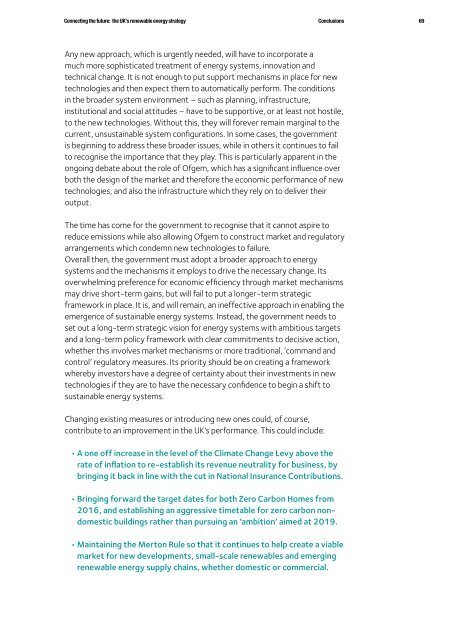Connecting the Future - Greenpeace UK
Connecting the Future - Greenpeace UK
Connecting the Future - Greenpeace UK
You also want an ePaper? Increase the reach of your titles
YUMPU automatically turns print PDFs into web optimized ePapers that Google loves.
<strong>Connecting</strong> <strong>the</strong> future: <strong>the</strong> <strong>UK</strong>’s renewable energy strategy<br />
Conclusions<br />
69<br />
Any new approach, which is urgently needed, will have to incorporate a<br />
much more sophisticated treatment of energy systems, innovation and<br />
technical change. It is not enough to put support mechanisms in place for new<br />
technologies and <strong>the</strong>n expect <strong>the</strong>m to automatically perform. The conditions<br />
in <strong>the</strong> broader system environment – such as planning, infrastructure,<br />
institutional and social attitudes – have to be supportive, or at least not hostile,<br />
to <strong>the</strong> new technologies. Without this, <strong>the</strong>y will forever remain marginal to <strong>the</strong><br />
current, unsustainable system configurations. In some cases, <strong>the</strong> government<br />
is beginning to address <strong>the</strong>se broader issues, while in o<strong>the</strong>rs it continues to fail<br />
to recognise <strong>the</strong> importance that <strong>the</strong>y play. This is particularly apparent in <strong>the</strong><br />
ongoing debate about <strong>the</strong> role of Ofgem, which has a significant influence over<br />
both <strong>the</strong> design of <strong>the</strong> market and <strong>the</strong>refore <strong>the</strong> economic performance of new<br />
technologies, and also <strong>the</strong> infrastructure which <strong>the</strong>y rely on to deliver <strong>the</strong>ir<br />
output.<br />
The time has come for <strong>the</strong> government to recognise that it cannot aspire to<br />
reduce emissions while also allowing Ofgem to construct market and regulatory<br />
arrangements which condemn new technologies to failure.<br />
Overall <strong>the</strong>n, <strong>the</strong> government must adopt a broader approach to energy<br />
systems and <strong>the</strong> mechanisms it employs to drive <strong>the</strong> necessary change. Its<br />
overwhelming preference for economic efficiency through market mechanisms<br />
may drive short-term gains, but will fail to put a longer-term strategic<br />
framework in place. It is, and will remain, an ineffective approach in enabling <strong>the</strong><br />
emergence of sustainable energy systems. Instead, <strong>the</strong> government needs to<br />
set out a long-term strategic vision for energy systems with ambitious targets<br />
and a long-term policy framework with clear commitments to decisive action,<br />
whe<strong>the</strong>r this involves market mechanisms or more traditional, ‘command and<br />
control’ regulatory measures. Its priority should be on creating a framework<br />
whereby investors have a degree of certainty about <strong>the</strong>ir investments in new<br />
technologies if <strong>the</strong>y are to have <strong>the</strong> necessary confidence to begin a shift to<br />
sustainable energy systems.<br />
Changing existing measures or introducing new ones could, of course,<br />
contribute to an improvement in <strong>the</strong> <strong>UK</strong>’s performance. This could include:<br />
• A one off increase in <strong>the</strong> level of <strong>the</strong> Climate Change Levy above <strong>the</strong><br />
rate of inflation to re-establish its revenue neutrality for business, by<br />
bringing it back in line with <strong>the</strong> cut in National Insurance Contributions.<br />
• Bringing forward <strong>the</strong> target dates for both Zero Carbon Homes from<br />
2016, and establishing an aggressive timetable for zero carbon nondomestic<br />
buildings ra<strong>the</strong>r than pursuing an ‘ambition’ aimed at 2019.<br />
• Maintaining <strong>the</strong> Merton Rule so that it continues to help create a viable<br />
market for new developments, small-scale renewables and emerging<br />
renewable energy supply chains, whe<strong>the</strong>r domestic or commercial.




![[2007] EWHC 311 - Greenpeace UK](https://img.yumpu.com/22079793/1/184x260/2007-ewhc-311-greenpeace-uk.jpg?quality=85)











